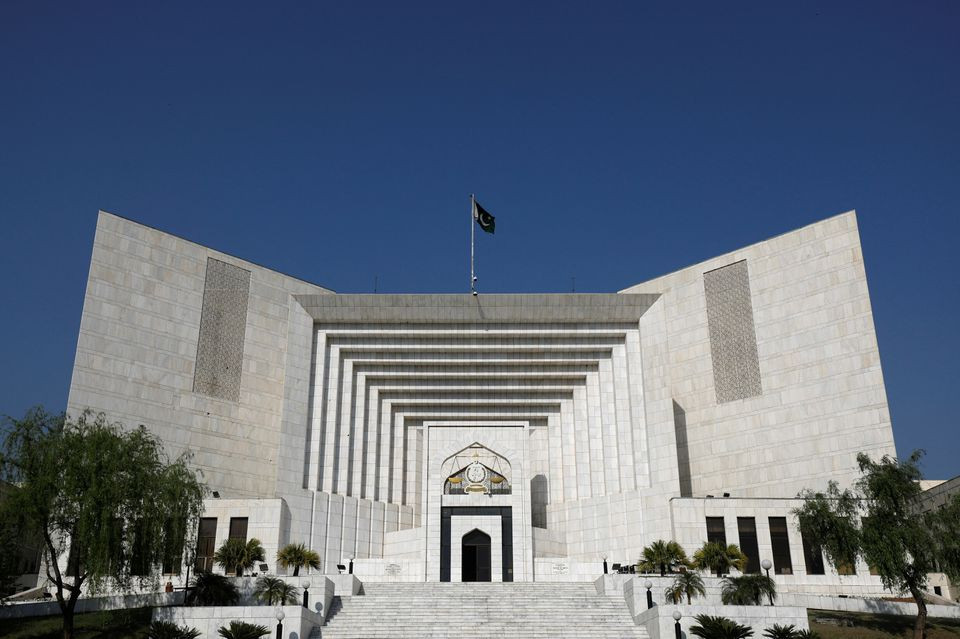
A review petition was filed on Friday challenging the Supreme Court's decision to declare amendments made to the National Accountability Ordinance (NAO) 1999 null and void.
The petitioner, Abdul Jabbar, through his counsel Farooq H Naek, has urged the court to set aside its verdict from September 15, 2023.
The petitioner claimed to be aggrieved by the court's judgment, stating that he was not a party to Pakistan Tehreek-e-Insaf Chairperson Imran Khan's constitutional petition challenging the amendments to the NAB law.
Particularly, the petitioner pointed to the minimum pecuniary threshold of NAB, which parliament had established at Rs. 500 million but had been reduced to Rs. 100 million under the apex court's decision.
The review petition raises several legal and factual grounds for reconsideration by the court, including questioning whether the court's verdict adhered to principles of natural justice, whether there was a breach of fundamental rights that required enforcement before the exercise of its original jurisdiction under Article 184(3) of the Constitution in the constitutional petition.
It also asked whether the court considered not declaring part of the legislation (the amendments to the NAB Ordinance) as ultra vires without considering the fundamental principles of parliamentary democracy.
Additionally, the petitioner argues that the impugned order derogates against the fundamental rights of the petitioner under Articles 4, 9, 10A, 14, and 25 of the Constitution. Moreover, the petitioner questioned whether the court's judgment did not declare the provisions of the amending Acts of the Parliament as ultra vires on the policy consideration and contrary to the ‘will of the people’, expressed through subject amendments.
It also requested the court to review whether the judgment has not curtailed the power of the parliament to enact legislation, as “it was the parliament which enacted the National Accountability Ordinance, 1999 and it’s the parliament alone to decide how and when to amend and/or alter the same”.
Read Institutions should not be pitted against one another: CJP Isa
“Whether the impugned judgment not failed to appreciate that the amendments carried out in the National Accountability Ordinance, 1999 by the Parliament did not take away any offence from the grip of law, but have streamed lined the same through channelling to the relevant authorities?” the review petition asked.
It went on to ask if the National Accountability (Amendment) Act, 2023 was rendered redundant and whether through the judgement, the top court “not assumed the position of being a ‘legislator’ and ‘policy maker’” which is beyond the scope of powers of the SC under Article 184(3) of the Constitution.
It also asked if the SC could decide the pecuniary threshold/jurisdiction of NAB, which was otherwise set by the parliament at Rs500 million?
It argued that the top court erred in not considering that there was neither any violation of the fundamental rights of the citizens of Pakistan nor the basic structure of the constitution was altered nor independence of the judiciary impinged nor the Islamic character of the constitution was altered thereby vesting jurisdiction in Supreme Court to pass judgement under Article 184(3) of Constitution.
It further asked whether the verdict was contradictory and based upon an incorrect interpretation of the law and two amendments of which certain provisions have been struck down in a discriminatory manner.
Case history
In a highly anticipated verdict on September 15, the SC in a majority decision allowed former premier Imran's petition challenging amendments made to the NAO 1999 by the Pakistan Democratic Movement's (PDM) coalition government, led by the Pakistan Muslim League-Nawaz (PML-N), and ordered the restoration of corruption cases against public office holders that were withdrawn following the tweaks.
The apex court, with a majority of 2 to 1 ordered the reopening of all corruption cases worth less than Rs500 million that were previously closed against political leaders from various parties and public office holders. The court declared the amendments null and void.
Furthermore, the top court directed the National Accountability Bureau (NAB) to return all case records to the relevant courts within seven days.
The verdict also highlighted that the NAB amendments in question impacted the rights of the public as outlined in the Constitution.
The order, announced by the former chief justice of Pakistan Umar Ata Bandial in his final session before retirement, stated, "By a majority of 2:1 (Justice Syed Mansoor Ali Shah dissenting), Constitution Petition No.21 of 2022 is allowed.
"The court has also invalidated the judgments issued by the accountability courts based on the amended laws.

1731486962-0/liam-(10)1731486962-0-165x106.webp)








1731486504-0/Copy-of-Untitled-(34)1731486504-0-270x192.webp)






COMMENTS
Comments are moderated and generally will be posted if they are on-topic and not abusive.
For more information, please see our Comments FAQ